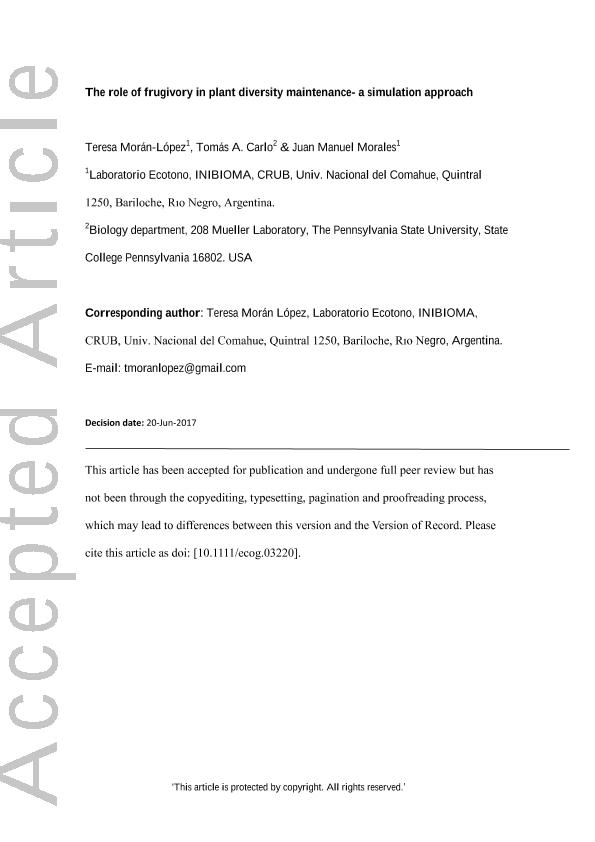Artículo
The role of frugivory in plant diversity maintenance – a simulation approach
Fecha de publicación:
01/2018
Editorial:
Wiley Blackwell Publishing, Inc
Revista:
Ecography
ISSN:
0906-7590
Idioma:
Inglés
Tipo de recurso:
Artículo publicado
Clasificación temática:
Resumen
Frugivores may play a key role in plant species coexistence by equalizing the species’ representation in the seed rain. Rare species may benefit from enhanced dispersal if frugivores prefer locally scarce fruits, or if rare plants are found in neighborhoods of high fruit density. Using a simulation model of frugivorous birds foraging on landscapes we tested if increased diversity in the seed rain could emerge from rare-biased fruit selection, from the spatial configuration of plants, or both. In the absence of rare-biased fruit selection, frugivores were not able to increase the diversity of the seed rain in any of our simulated landscapes. In contrast, when frugivores were attracted to locally scarce fruits, we found increased diversity in the seed rain whenever frugivore mobility across the landscape was high and plant species were well-mixed in the fruiting neighborhoods. Irrespectively of the behavioral mechanism involved, landscape fragmentation lead to losses in diversity and species richness of simulated communities. In all simulations, density-dependent mortality of dispersed seeds increased diversity in the community of seedlings. However, landscape homogenization at the scale of frugivores movements decreased the magnitude of this diversification effect. In summary, our study shows that frugivory has the potential to increase diversity in the seed rain when frugivores display rare-biased fruit choices, provided that rare and common plants form heterogeneous neighborhoods. They also show that fragmentation is a major threat for diversity maintenance in the early-regenerating community. Finally, they show that rarity confers advantages during regeneration only if it occurs at the scale of frugivores’ foraging decisions.
Palabras clave:
Frugivory
,
Diversity
,
Rarity
Archivos asociados
Licencia
Identificadores
Colecciones
Articulos(INIBIOMA)
Articulos de INST. DE INVEST.EN BIODIVERSIDAD Y MEDIOAMBIENTE
Articulos de INST. DE INVEST.EN BIODIVERSIDAD Y MEDIOAMBIENTE
Citación
Morán López, Teresa; Carlo, Tomás A.; Morales, Juan Manuel; The role of frugivory in plant diversity maintenance – a simulation approach; Wiley Blackwell Publishing, Inc; Ecography; 41; 1; 1-2018; 24-31
Compartir
Altmétricas




